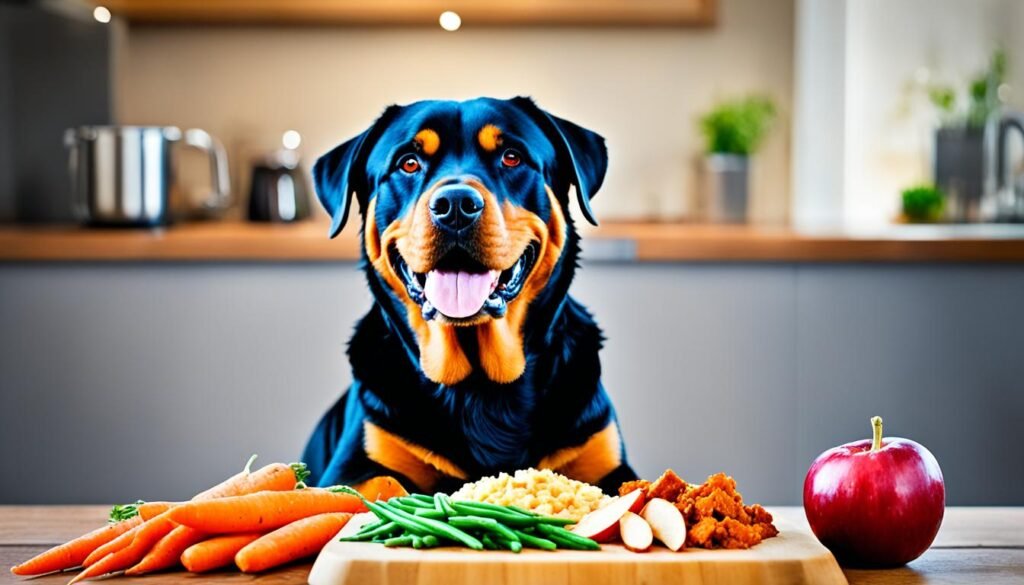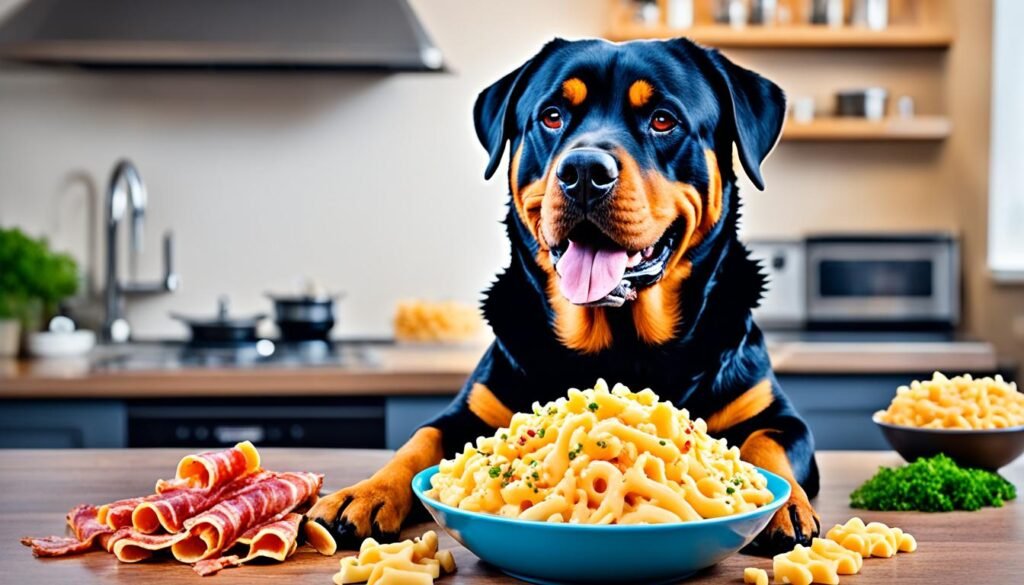As a proud Rottweiler owner, I always strive to provide the best for my furry companion. I understand the joy of sharing food with our dogs, and it’s hard to resist their pleading eyes when we’re enjoying a delicious meal ourselves. However, when it comes to certain human foods, we need to be cautious and consider the impact on our four-legged friends.
One question that often comes up is whether Rottweilers can eat mac and cheese. It may seem innocent enough to share a bite of this classic comfort food, but the truth is that it’s not suitable for our beloved canines. While it may be tempting to indulge them, we must prioritize their health and well-being above all else.
Key Takeaways:
- Mac and cheese is not recommended for Rottweilers due to its unhealthiness.
- The seasonings, salt, oils, dairy, gluten, and artificial ingredients present in mac and cheese can be harmful to dogs.
- Dogs can experience digestive issues such as tummy aches, vomiting, and diarrhea if they consume mac and cheese.
- There are healthier alternatives for dogs, such as baked sweet potato, raw vegetables, fruits, and unseasoned fish or shrimp.
- It is important to consult with a veterinarian for specific recommendations based on your dog’s individual needs.
Why Mac and Cheese is Unsuitable for Dogs
Mac and cheese may be a favorite comfort food for us humans, but it’s important to remember that it is not a healthy choice for our canine companions. There are several reasons why dogs shouldn’t eat mac and cheese.
Unhealthy Food for Dogs: Dogs often experience lactose intolerance, which means they lack the enzyme needed to break down lactose found in dairy products like cheese. This can lead to digestive issues such as stomach aches, vomiting, and diarrhea when dogs consume mac and cheese.
Gluten Intolerance: Additionally, mac and cheese is typically made with wheat pasta, which can cause gluten intolerance in some dogs. Gluten sensitivity can trigger gastrointestinal problems and other symptoms like diarrhea, weight loss, hair loss, and skin irritation.
Adverse Effects on Health: The high-fat content, artificial ingredients, and processed nature of mac and cheese further contribute to its unsuitability for dogs. Consuming these can potentially lead to obesity, pancreatitis, and digestive issues in dogs. Moreover, mac and cheese might contain toxic ingredients like onions and garlic, which are harmful to dogs’ health.
It’s important to prioritize the well-being of our furry friends and provide them with a balanced and healthy diet that meets their specific nutritional needs.
Knowing the adverse effects of feeding mac and cheese to dogs, it’s best to opt for safer and healthier alternatives to ensure our pets remain happy and healthy. Make sure to consult with a veterinarian for appropriate dietary recommendations tailored to your dog’s individual needs.
Potential Health Issues

When it comes to feeding mac and cheese to dogs, there are several potential health issues to consider. Dogs with lactose intolerance can experience vomiting and diarrhea if they consume mac and cheese. Lactose intolerance is the inability to digest lactose, the sugar found in milk and other dairy products. Just like some humans, dogs can also be lactose intolerant, which means they lack the enzyme lactase needed to break down lactose.
Gluten intolerance is another common health concern in dogs. Mac and cheese often contain wheat pasta, which contains gluten. Gluten intolerance can lead to gastrointestinal issues and other symptoms such as diarrhea, weight loss, hair loss, and skin irritation.
Additionally, the high-fat content in mac and cheese can have adverse effects on a dog’s health. Dogs are not designed to handle high levels of fat in their diets, and consuming mac and cheese regularly can contribute to obesity. Obesity in dogs can lead to a range of health problems, including joint issues, heart disease, and diabetes. Furthermore, the high-fat content can also increase the risk of pancreatitis, a serious and potentially fatal illness in dogs.
The presence of artificial ingredients and the processed nature of mac and cheese can also cause digestive issues and allergic reactions in some dogs. These ingredients may not be well-tolerated by dogs’ sensitive digestive systems, leading to symptoms such as stomach discomfort, gas, and diarrhea.
It’s important to remember that each dog is unique, and their tolerance to certain foods may vary. Some dogs may be able to handle small amounts of mac and cheese without adverse effects, while others may experience immediate or long-term health problems. However, as a general rule, it’s best to avoid feeding mac and cheese to dogs to ensure their overall health and well-being.
Healthy Alternatives for Dogs

Rather than feeding your Rottweiler mac and cheese, there are plenty of healthier alternatives that can be incorporated into their diet. Providing safe treats and nutritious snacks for Rottweilers is essential for their overall well-being.
Safe treats for Rottweilers:
- Baked sweet potato: A delicious and nutrient-rich option that is packed with vitamins and fiber.
- Raw or cooked and unseasoned vegetables: Carrots, broccoli, and squash are excellent choices that provide essential vitamins and minerals.
- Raw fruits: Pineapple, banana, and red bell peppers offer natural sweetness and additional health benefits.
- Fully cooked and unseasoned fish or shrimp: Rich in omega-3 fatty acids and lean protein, fish and shrimp can be a tasty and wholesome alternative to mac and cheese.
When selecting dog-friendly human foods as an alternative to mac and cheese, remember to avoid seasoning or adding any harmful ingredients. Consulting with a veterinarian will help you determine the specific recommendations based on your Rottweiler’s individual needs and dietary requirements.
Providing healthy alternatives to traditional human foods like mac and cheese ensures that your Rottweiler receives a balanced diet and avoids the potential risks associated with certain ingredients. By making educated choices about their nutrition, you can promote their overall health and well-being.
Moderation and Care

If you choose to feed your dog cheese in moderation, it is important to consider portion sizes based on their breed size. Feeding cheese to dogs in moderation is key to ensuring their overall health and well-being. Consulting a veterinarian for your dog’s diet is always recommended to receive professional guidance tailored to your dog’s specific needs.
Portion Sizes for Dogs
Portion sizes for dogs can vary depending on their size and breed. It’s essential to feed your furry friend the right amount of cheese to avoid any potential health issues.
- Extra-small dogs: For dogs on the smaller side, such as Chihuahuas or Yorkshire Terriers, it’s advisable to give them one or two small pieces of cheese.
- Small dogs: Breeds like Shih Tzus or Dachshunds may be given two to three pieces of cheese in moderation.
- Medium dogs: Dogs like Beagles or Bulldogs can enjoy five to six pieces of cheese, provided it is within their overall balanced diet.
- Large or extra-large dogs: For larger breeds like Labradors or Great Danes, it is acceptable to offer them five to six pieces of cheese, taking care not to exceed their calorie requirements.
Remember, moderation is key! Feeding cheese to dogs in moderation ensures they can still savor a tasty treat without compromising their dietary needs.
Consulting a Veterinarian for Your Dog's Diet
While cheese can be fed to dogs in moderation, it is always advised to consult with a veterinarian regarding your dog’s diet and nutrition. Each dog is unique, and their dietary requirements may differ based on factors like age, weight, and overall health. A veterinarian can provide personalized recommendations and guidance to ensure your dog’s diet is balanced and appropriate for their specific needs.
Conclusion
In conclusion, it is important to understand that while dogs can technically eat cheese, mac and cheese is not a suitable choice for their diet. The truth about dogs and mac and cheese is that it can have negative effects on their health. The seasonings, salt, oils, dairy, gluten, artificial ingredients, and high-fat content found in mac and cheese can potentially lead to digestive issues and other health problems in dogs. It is best to prioritize their well-being by providing a balanced and appropriate diet consisting of dog-friendly foods.
Feeding mac and cheese to dogs should be avoided due to the potential risks it poses to their health. Instead, opt for nutritious alternatives that are safe for dogs. By consulting with a veterinarian, you can determine the best options for your furry friend’s dietary needs. Remember, their overall health and well-being should be the top priority when considering their food choices.
When it comes to the truth about dogs and mac and cheese, it is clear that this popular comfort food is not a suitable or recommended option for our canine companions. Ensure you make informed decisions about your dog’s diet and provide them with the proper care they deserve. By doing so, you can help keep them happy, healthy, and thriving for years to come.
FAQ
Can Rottweilers eat mac and cheese?
Mac and cheese is not a suitable dietary option for Rottweilers. While it is technically possible for dogs to eat mac and cheese, it is not recommended due to its unhealthiness.
Why is mac and cheese unsuitable for dogs?
Mac and cheese is unhealthy for dogs due to its high-fat content, artificial ingredients, processed nature, and potential presence of toxic ingredients like onions and garlic. Additionally, dogs often suffer from lactose intolerance and may also have gluten intolerance, making mac and cheese even more unsuitable for their consumption.
What are the potential health issues of feeding mac and cheese to dogs?
Dogs with lactose intolerance can experience digestive issues such as vomiting and diarrhea if they consume mac and cheese. Gluten intolerance can also cause gastrointestinal problems, weight loss, hair loss, and skin irritation. The high-fat content in mac and cheese can lead to obesity and pancreatitis in dogs.
What are some healthy alternatives for dogs?
Instead of mac and cheese, you can incorporate healthier options into your Rottweiler’s diet. Some alternatives include baked sweet potato, raw or cooked and unseasoned vegetables like carrots, broccoli, and squash, raw fruits like pineapple, banana, and red bell peppers, and fully cooked and unseasoned fish or shrimp.
How should I feed cheese to my dog?
If you choose to feed your dog cheese in moderation, consider portion sizes based on their breed size. Extra-small dogs can have one or two small pieces, small dogs can have two to three pieces, medium dogs can have five to six pieces, and large or extra-large dogs can have five to six pieces. However, always consult with a veterinarian regarding your dog’s diet and nutrition.
